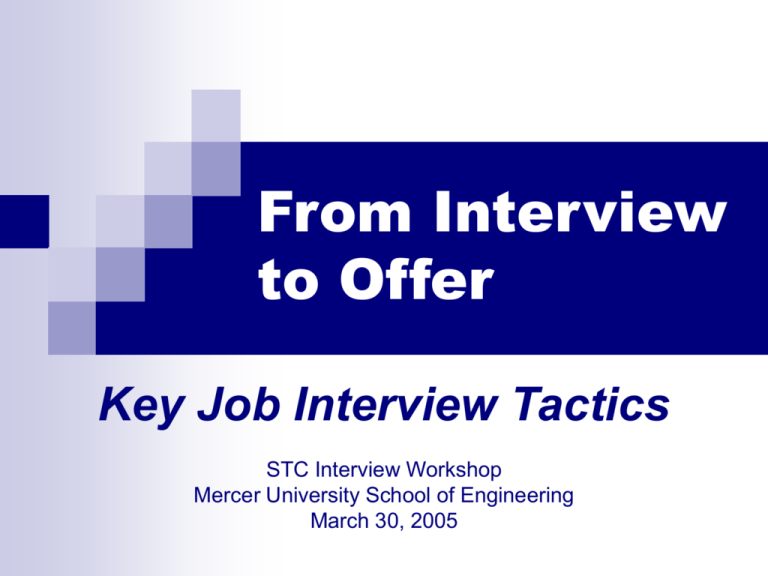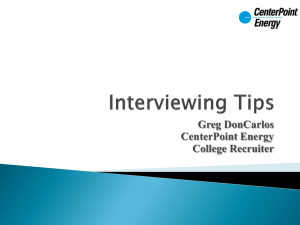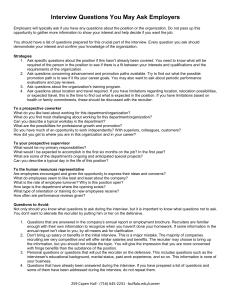From Interview to Offer ()
advertisement

From Interview to Offer Key Job Interview Tactics STC Interview Workshop Mercer University School of Engineering March 30, 2005 Preparation is the Key Be ready to answer recruiters’ questions by doing company research. Product lines, services offered Locations Current events Mission and goals Corporate culture Set the right tone for your interview Stress your best qualities through: Appearance Demeanor Eye contact Word choice Tone of voice Body language Know your rights Illegal questions probe into your private life or personal background. Forbidden by federal law. Can’t discriminate based on these things: Sex or sexual preference Religion Age Marital Status Whether you have or plan to have children Recruiters seek 12 types of information Your passion for their business Motivation, purpose Skills, experience Diligence, professionalism Creativity, leadership Compatibility with job Personality, cultural compatibility Management style, interpersonal skills Problem-solving ability Career aspirations Accomplishments Personal interests, hobbies Your passion for their business Recruiter needs to know you’re a good match for their company. Examples: Why are you interested in working in this field in this industry? Why would you be particularly good at this business? How do you stay current? Why do you think this industry would sustain your interest over time? Where do you want to be in five years? Motivation, purpose Recruiter needs to know why this interview is important to you. Examples: Tell me what you know about this company. What‘s your favorite product made by our company? Why do you want to work here? What particular aspect of this company interests you most? Tell me what you think our distinctive advantage is within the industry. Skills, experience Recruiter needs to know why you’re the best candidate. Examples: What are your key skills? How will you use your key skills in this job? How is your experience relevant to this job? What skills do you think are most critical to this job? If you needed to stay at your current job, what would you spend more time on? Why? Diligence, professionalism Your professional character: thoroughness, diligence, accountability Examples: Give an example of how you saw a project through, despite obstacles. Describe a time when you tackled a tough or unpopular assignment. Describe a professional skill you’ve developed in your most recent job. What personal skill or work habit have you struggled to improve? Creativity, leadership Give examples of your initiative, resourcefulness, leadership abilities. Examples: What color is your brain? Consider the following scenario . . . Describe the situations in which you are most comfortable as a leader. Describe your comfort level working with people of higher rank and people of lower rank. Compatibility with this job Interviewer needs to know your qualifications, skills, related experiences. How you fit position requirements. Examples: What interests you most about this job? What interests you least about this job? What concerns you most about performing this job? What is your most productive or ideal work setting? Personality, cultural compatibility Recruiter needs to know how you work with others personality types and how clients will relate to you. Examples: What would your friends tell me about you? Describe your personality beneath the professional image. How will you complement this department? Tell me what you learned from a recent book. Are you most productive working alone or in a group? Management style, interpersonal skills What kind of colleague will you be? Examples: Tell me about an effective manager, supervisor or other person in a leading role you’ve known. What type of people do you work with most effectively? How do you organize and plan for major projects? Describe a time when you’ve worked under intense pressure. What aspect of your management style would you like to change? Problem-solving ability Recruiter needs to learn how you resolve difficult or challenging issues. Examples: How do your technical skills, combined with other skills, add to your effectiveness on the job? How do you usually go about solving a problem? How do you measure the success of your work? Tell me about the most difficult problem you’ve ever dealt with? Accomplishments Recruiter needs to see what you can contribute to the organization. Examples: Talk about a contribution you’ve made to a team. What accomplishment is your greatest source of pride? Tell me about a need you fulfilled within a group. What situations do your colleagues rely on you to handle? Career Aspirations Do your goals match the company’s goals? Examples: Where do you hope that your career will have progressed to in the next few years? Since this will be your first career position, how do you know you’ll like the career path? Why is this the right job for you at this time in your career? What new challenges would you enjoy? Tell me about your salary expectations. Personal interests, hobbies Recruiter needs to know that your personal and career goals are compatible. Examples: What outside activities complement your work interests? What do you do to relax? Our company believes that employees should give time back to the community. How do you feel about it? Questions you might ask Never leave without asking questions. Examples: Assuming I were hired and performed well, what additional opportunities might be open to me? Your firm has a terrific reputation in marketing. What are the major insights into the marketing process that I might gain from this position? I’d really like to work for your firm. I think it’s a great company and I’m confident I can do this job well. What’s the next step in the selection process? Zingers! Interview questions you may not want to hear Tell me about a project in which you were disappointed with your personal performance. Describe roadblocks and what you did to get around them. How have your skills come into play? In hindsight, what could you have done differently? What lessons have you learned? What would you do if I told you that I think you are giving a poor interview today? This is a stress question meant to see how well you hold up under pressure. Stay calm and relaxed. Don’t allow your confidence to be shaken. Tell me about your most difficult work or personal experience. Shows how you hold up under pressure. Describe a situation (personal or professional) that involved a great deal of conflict and challenge and placed you under an unusual amount of stress. Don’t reveal anything that would be covered by an “illegal question.” What specific problems did you face? How did you resolve them? If this were your first annual review with our company, what would I be telling you right now? Present a positive impression. Don’t say something like, “I wish you’d show up on time more often.” Focus on one or two of your key strengths. How have you handled criticism of your work? Shows your accountability and professional character. Describe a specific project or work habit that caused you a problem until you faced up to it and overcame it. Or describe a time you responded objectively and professionally to particularly harsh criticism of your work. What aspects of your work are most often criticized? Recruiter is trying find your weaknesses. Give an example from an early job. Tell what you did to overcome the situation and improve your work. Discuss how failure inspired you to pay more careful attention to detail in your work. Tell me about a problem you’ve had getting along with a work associate. Avoid talking about a personality clash. Focus on differences in work ethics or culture between you and associate. Focus on something with which the interviewer may empathize. Describe someone whose standards of excellence were lower than yours. Why weren’t your grades better? Relax. You already match their basic criteria, including education requirements. Helps interviewer judge how you handle adversity. Don’t be defensive or place blame. Put a positive spin on question. Was there a course that you found particularly challenging? Question shows how well you respond to difficult situations. Demonstrate that you won’t fold in the face of difficulty. Show that you’re willing to put in the extra effort to meet a challenge. Why didn’t you participate in more extracurricular activities? Interviewer needs to know you have interests outside school or work so you won’t suffer burnout. Talk about less formal activities like reading, physical fitness, running, hiking that aren’t team sports. Focus on volunteerism, community service. After Your Interview Follow up Ask yourself these key questions: What does the position entail? What do like and dislike about the job and the company? Did I make any mistakes or have trouble answering interview questions? Do I feel that I was well prepared? If not, what can I do to improve on future interviews? Write A Thank-You Letter Express appreciation for interview time. Express continued enthusiasm for position and company. Recap strengths as they relate to job requirements. Answer any questions you couldn’t answer during interview. Request a follow-up interview. After the Offer . . . Consider start date Job title and associated responsibilities Work environment Salary, overtime, compensation Bonus structure Tuition reimbursement Vacation, parental leave policy Pension plan Travel requirements Office of Career Services Mercer University 478.301.2863 www.mercer.edu/career Information for this presentation from taken from The 250 Job Interview Questions You’ll Most Likely be Asked and the Answers That Will Get You Hired! by Peter Veruki Director of Career Planning and Placement at the Owen Graduate School of Management Vanderbilt University. (Adams Media Corp. 1999)






